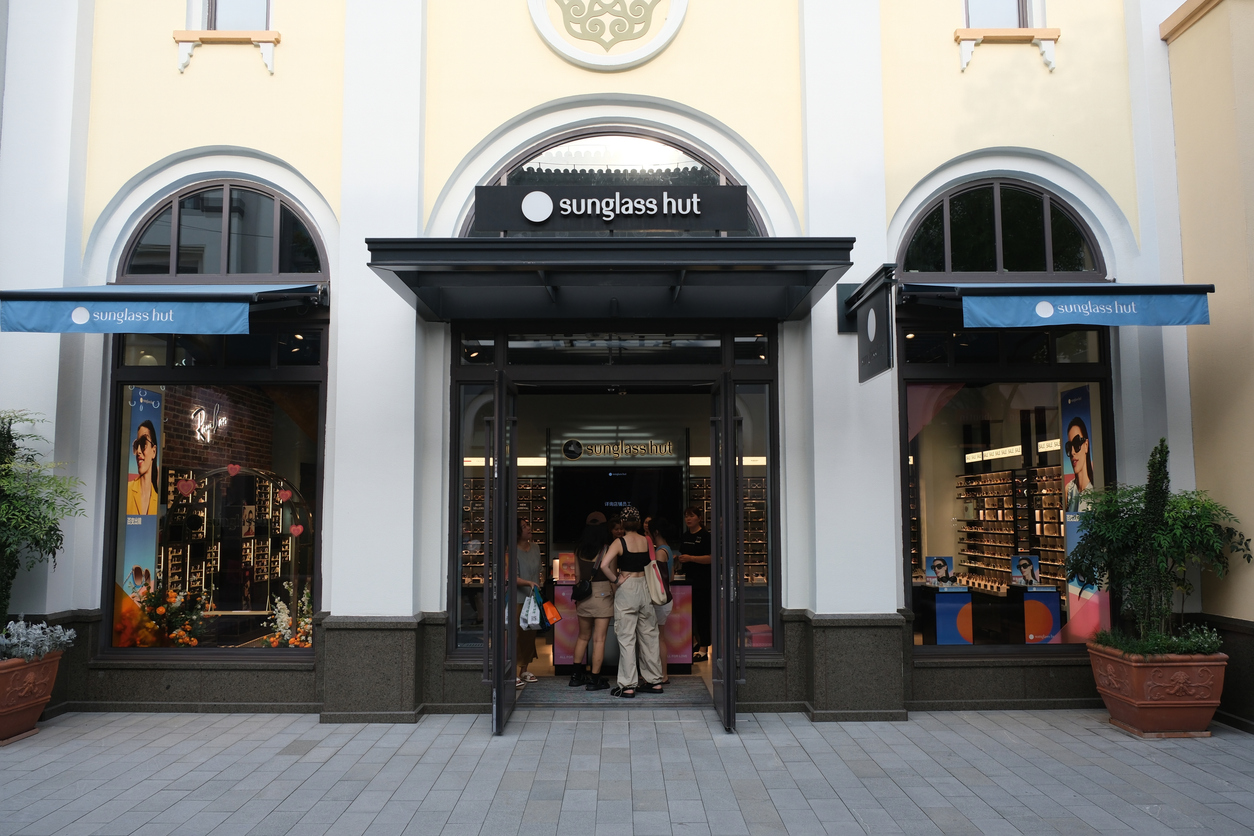Of the biggest names in the eyewear industry, Sunglass Hut is among the most prominent. This Florida-born brand is an international go-to for high-end sunglasses, which is why it's no surprise that it operates in over 20 countries and is one of the most common mall stores you'll find in America. With our article adding that younger generations like millennials and Gen Z will comprise 45% of the global personal luxury goods market by as early as 2025, it also continues to expand its reach and appeal to this rising segment as the years go on.
Of the biggest names in the eyewear industry, Sunglass Hut is among the most prominent. This Florida-born brand is an international go-to for high-end sunglasses, which is why it's no surprise that it operates in over 20 countries and is one of the most common mall stores you'll find in America. With our article adding that younger generations like millennials and Gen Z will comprise 45% of the global personal luxury goods market by as early as 2025, it also continues to expand its reach and appeal to this rising segment as the years go on.
As a result, the brand is becoming even more prominent. That's especially apparent here in the UK. The retailer recently opened a new branch at the premier shopping centre Manchester Arndale—which, according to the official Sunglass Hut website, brings its total number of locations in the country to 52. Yet despite these rapid expansions, Sunglass Hut manages to retain a robust brand identity, build a strong and loyal customer base, and continuously improve its bottom line.
All these aspects make it a great case study for companies looking to reach new heights similarly. Here are a few lessons any business can glean from how it operates:
Lesson 1: invest in omnichannel experience
Sunglass Hut makes it a point to bridge physical and online shopping options—resulting in a seamless, omnichannel customer experience. To create a more personalised in-store shopping journey, the brand uses cameras and sensors alongside software like RetailNext to determine how customers at a specific location usually peruse its offerings. It can then use that data to change how that store presents its products, making it easier for people to find what they want or need. The company provides a similarly smooth experience for customers who prefer the accessibility and convenience of online shopping. Sunglass Hut's full range of sunglasses, which includes brands like Ray-Ban and even Bvlgari, is easily available on its official website. Here, users can shop by brand, discern what kind of eyewear they need with the help of in-depth guides, and even check how specific models look via virtual try-on. The online checkout is comparable to physical shopping thanks to same-day in-store pickup options. Learning to provide similar flexibility can help businesses attract more customers with optimal omnichannel experiences.
Lesson 2: leverage partnerships for directed marketing campaigns
Partnerships with major celebrities and brands are a key strategy Sunglass Hut uses to appeal to customers across different market segments. For example, it collaborates with models like Gigi Hadid, English designer Gareth Pugh, and even London Fashion Week to attract more individuals interested in high fashion. It's also worked with avatar creation company Ready Player Me to help users bring Ray-Ban and Oakley sunglasses to virtual worlds—an excellent draw for tech-savvy potential customers. Sunglass Hut even partners with the brands in its catalogue to offer limited-edition models. That includes a Versace for Sunglass Hut collection that comes in exclusive colourways, as well as unique versions of Oakley's Radar® EV Path® and Flak® 2.0 XL sunglasses with special temple engravings in commemoration of Sunglass Hut's 50th anniversary. This ability to curate partnerships for directed marketing campaigns is another lesson businesses may want to pick up: with it, companies can stop wasting resources wooing cold audiences, maximise their reach, more effectively turn leads into paying customers—and ultimately improve their revenue.
Lesson 3: foster customer loyalty
View this post on Instagram
Credit: @sunglasshut on Instagram
The insights this eyewear retailer has to offer extend beyond just attracting new customers and providing them with seamless brand experiences. One of the final key lessons it has to teach involves fostering retention and brand loyalty. In March 2024, Sunglass Hut revealed The Sun Club loyalty programme, its first one-of-a-kind rewards system. Purchases made under this free-to-join programme can help customers advance through four loyalty tiers and receive incremental benefits in the form of exclusive access to limited-edition products, free expedited shipping, birthday discounts, and more. Users can also sign up in-store and online, allowing the brand to reward customers for their loyalty in ways that ultimately enhance their shopping experiences. Though loyalty programmes are already a proven and cost-effective way to improve customer engagement and retention, emulating the structure and mechanics touted by The Sun Club can help businesses further amplify these benefits by making their programmes more accessible and enticing to join.
Sunglass Hut's resounding success as an eyewear retailer exemplifies how businesses can easily scale their business without compromising the quality of their products and services—making the lessons they can learn from the brand all the more vital. For more aspirational business posts, keep browsing our articles in CEO Today Magazine.










